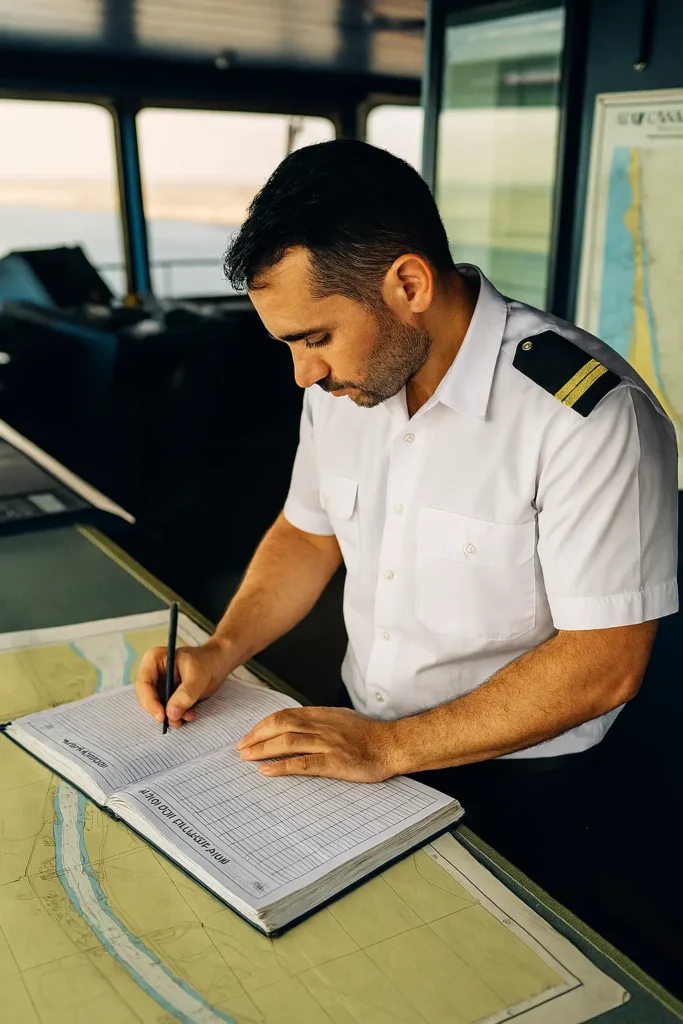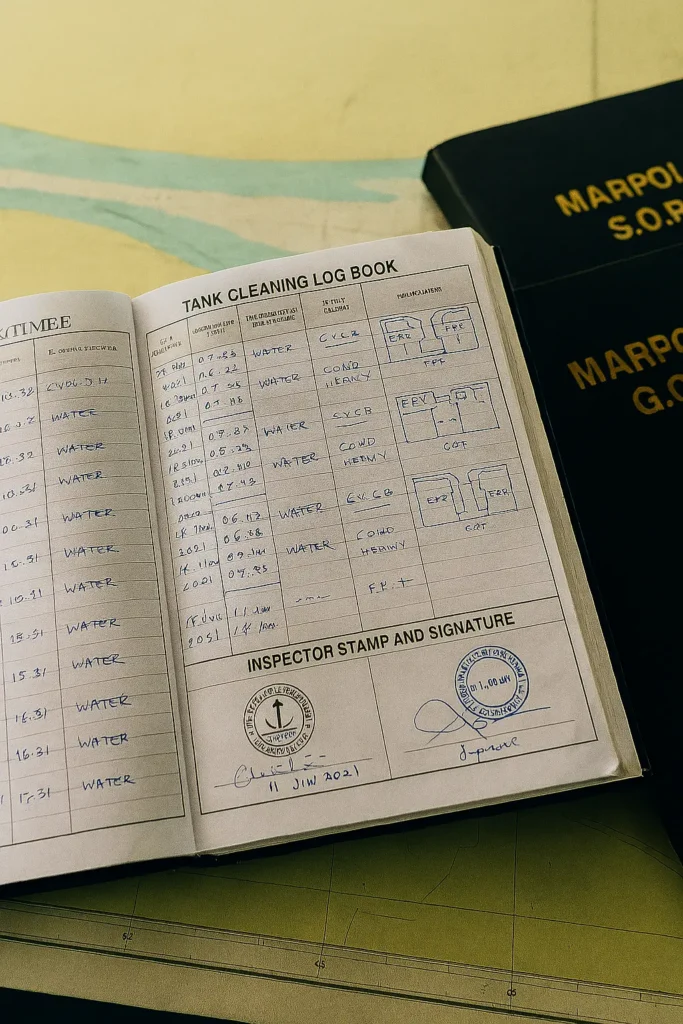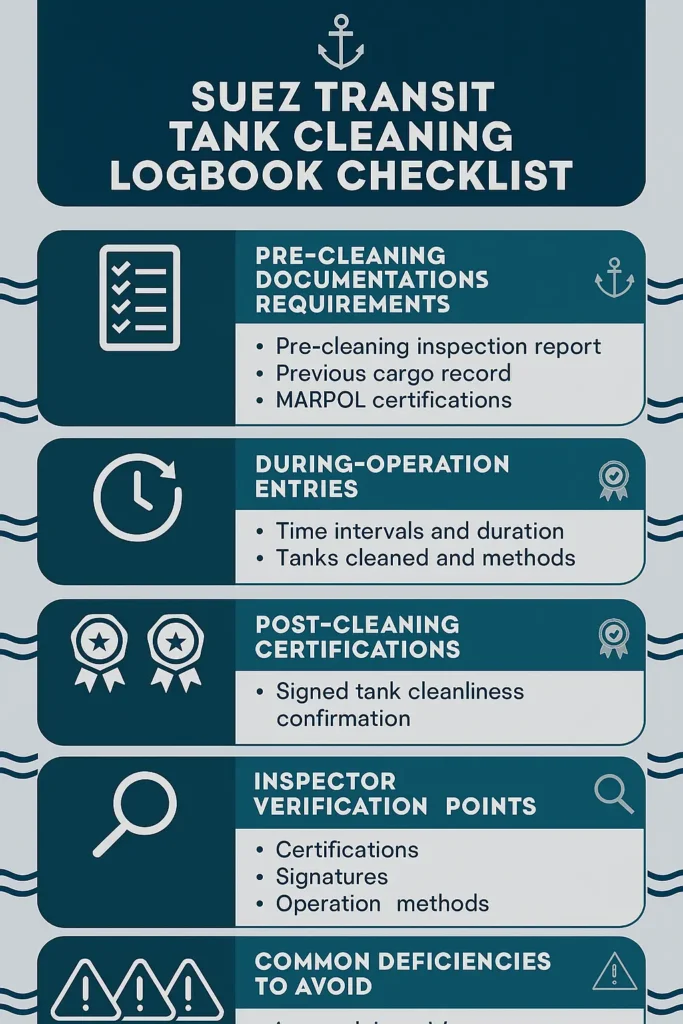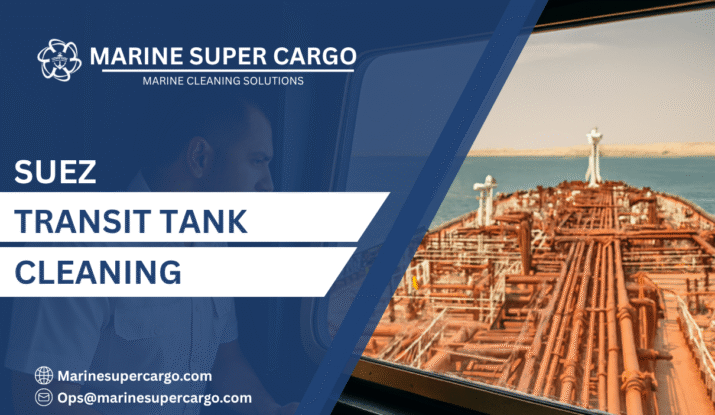Understanding Suez Transit Tank Cleaning Documentation
Navigating through the Suez Canal demands meticulous preparation, particularly regarding tank cleaning logbook requirements. Vessels carrying petroleum products, chemicals, or other cargo residues must maintain comprehensive documentation to ensure smooth transit through this critical waterway.
At Marine Super Cargo, we understand that proper logbook maintenance isn’t just regulatory compliance—it’s your vessel’s passport through the Suez Canal. The Suez Canal Authority (SCA) enforces strict verification protocols, making accurate Suez Transit tank cleaning records absolutely essential for maritime operations.
MARPOL Annex II Requirements for Chemical Tankers
MARPOL Annex II establishes stringent requirements for vessels transporting noxious liquid substances. Your Suez Transit tank cleaning logbook must record prewash procedures, ventilation durations, and residue disposal methods for each cargo tank accessed during the voyage.
The International Maritime Organization (IMO) mandates that cargo record books contain entries detailing tank stripping operations, washing medium temperature, and final inspection outcomes. Marine Super Cargo specialists ensure every entry meets both IMO standards and SCA inspection criteria.
Chemical tankers require particularly detailed documentation showing complete cargo removal from all port and starboard tanks. Certificates from approved surveyors must accompany logbook entries, confirming that residues meet discharge criteria outlined in MARPOL protocols.
Oil Tanker Documentation Standards
Oil tankers transiting Suez must maintain Oil Record Books Part I and Part II with exceptional precision. Every ballasting operation, tank cleaning sequence, and slop tank transfer requires timestamped entries signed by responsible officers aboard your vessel.
The logbook should document cleaning methods employed—whether crude oil washing, hot water washing, or chemical cleaning agents. Marine Super Cargo provides comprehensive tank cleaning services that include complete documentation support, ensuring your records withstand SCA scrutiny.
Entries must specify which tanks underwent cleaning procedures, recording progression from forward cargo tanks toward aft sections. Documentation of ullage readings before and after operations provides verifiable evidence of thorough cleaning completion.


Essential Logbook Entries for Suez Transit
Your Suez Transit tank cleaning logbook must contain specific information elements that SCA inspectors verify during canal passage. Each entry should include date, time, vessel position coordinates, and detailed descriptions of operations performed on both port and starboard tank configurations.
Record the cleaning method applied, duration of operations, water temperature for washing procedures, and quantities of wash water used. Document any residues transferred to slop tanks or shore reception facilities, including facility receipts and transfer volumes . Suez Transit Tank Cleaning
Inspector signatures confirming tank atmosphere testing results, gas-free certificates, and declarations of tank readiness must appear chronologically. Marine Super Cargo ensures these critical signatures and certifications meet international standards before your vessel approaches the canal.

SCA Inspection Protocol Preparation
Suez Canal Authority inspectors board vessels at anchorage to verify tank cleaning compliance. They examine logbooks for completeness, consistency, and evidence of proper MARPOL adherence throughout your voyage preparation.
Inspectors focus on recent entries covering the 72-hour period preceding canal entry. Any discrepancies between logbook records and physical tank conditions can result in transit delays or denial of passage through the waterway.
Marine Super Cargo recommends conducting internal audits of your documentation before reaching Suez anchorage. Our previous guidelines on tank cleaning best practices emphasize proactive compliance verification.
Digital vs. Manual Logbook Systems
Modern vessels increasingly utilize electronic record-keeping systems for Suez Transit tank cleaning documentation. Digital logbooks offer advantages including automatic timestamp verification, tamper-evident entries, and simplified data retrieval during inspections Suez Transit Tank Cleaning.
However, SCA still accepts traditional manual logbooks when properly maintained with indelible ink entries, no alterations, and continuous page numbering. Regardless of format chosen, accuracy and completeness remain paramount for successful transit approval.
Common Documentation Deficiencies to Avoid
Missing signatures from chief officers or masters frequently cause logbook rejections during Suez inspections. Every significant operation entry requires proper authorization signatures from responsible deck officers overseeing the procedures.
Incomplete transfer records showing residue disposal create compliance concerns. Always obtain and attach receipts from shore facilities, including facility name, location coordinates, and quantities received for your vessel’s records Suez Transit Tank Cleaning.
Vague descriptions like “tank cleaned” lack the specificity inspectors demand. Specify the exact cleaning method, equipment used, and verification measurements obtained throughout the process.
Frequently Asked Questions
Q1: How far back do Suez Canal inspectors review tank cleaning logbooks?
Inspectors typically examine entries from the past 30 days, with particular focus on operations performed within 72 hours before arrival at the canal anchorage.
Q2: Can electronic logbooks replace traditional paper records for Suez Transit?
Yes, SCA accepts electronic record systems provided they meet IMO requirements for data integrity, backup systems, and inspector accessibility during examinations.
Q3: What happens if tank cleaning documentation is incomplete during Suez inspection?
Vessels may face transit delays, additional inspections, or requirement to complete proper cleaning and documentation before receiving canal passage approval.
Q4: Do gas-free certificates need to be attached to tank cleaning logbooks?
Yes, certificates from competent persons confirming safe tank atmosphere conditions must accompany relevant logbook entries for inspector verification.
Q5: How does Marine Super Cargo assist with Suez Transit documentation compliance?
Marine Super Cargo provides comprehensive tank cleaning services including complete logbook preparation, certification coordination, and compliance verification before your vessel reaches the canal.


